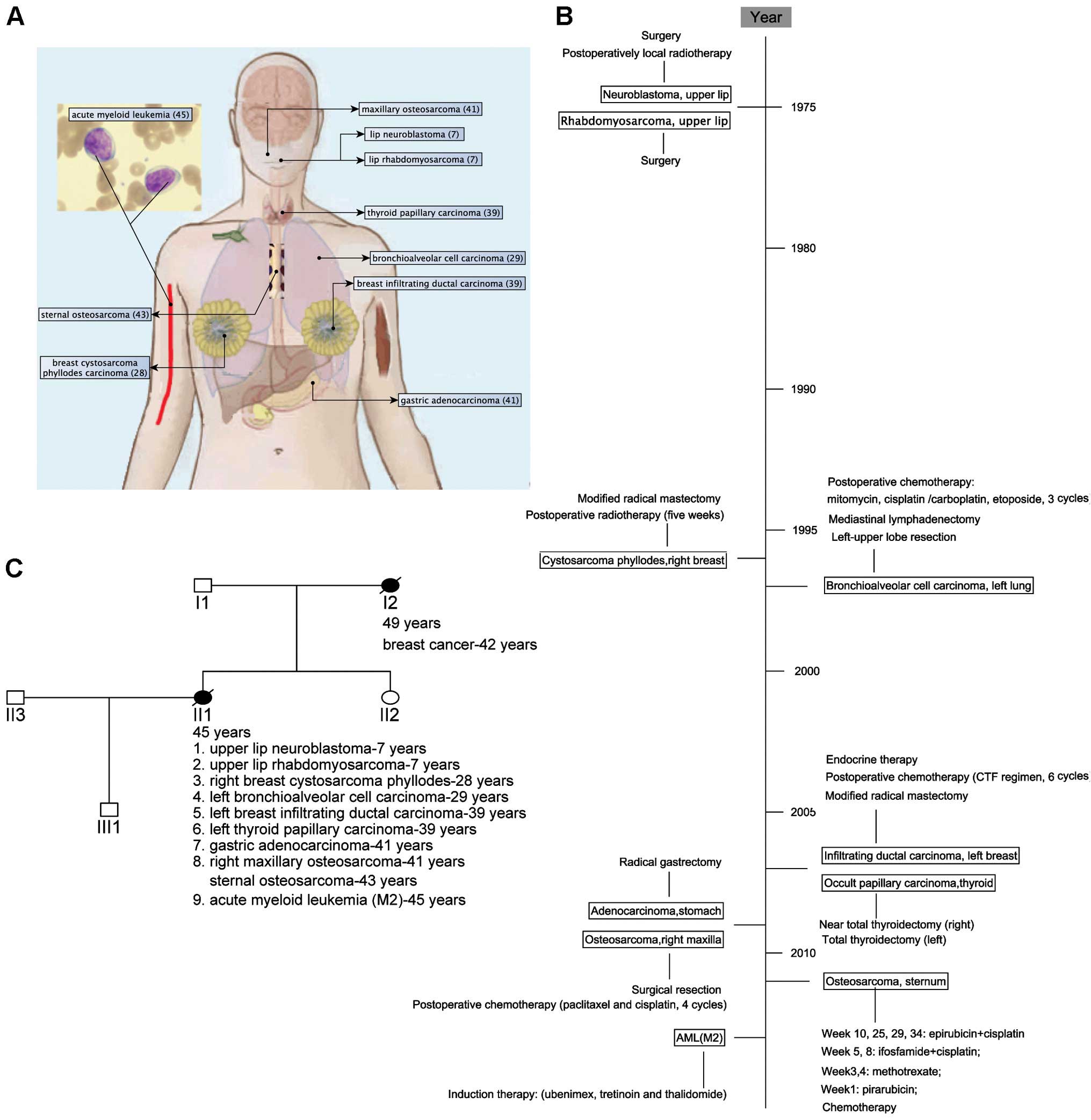Recent studies have shown that the majority of these tumors are estrogen receptor ER positive with frequent HER2 co-expression. Many individuals with Li-Fraumeni syndrome develop two or more primary cancers over their lifetimes.
 Cancers Li Fraumeni Syndrome Association
Cancers Li Fraumeni Syndrome Association
Some day we will hopefully be able to predict which cancers are linked to certain mutations and then even prevent cancer from forming.

Li fraumeni cancer syndrome. Li-Fraumeni syndrome is a disorder that causes an individuals risk of developing certain types of cancers to be significantly greater than the general population. Individuals with Li-Fraumeni syndrome have an approximately 50 of developing cancer by age 40 and up to a 90 percent chance by age 60 38 while females have nearly a 100 risk of developing cancer in their lifetime due to their markedly increased risk of breast cancer. History of Li-Fraumeni Syndrome LFS and the LFS Association 1969.
Li-Fraumeni Syndrome can be frustrating. LiFraumeni syndrome LFS is a rare cancer predisposing condition caused by germline mutations in TP53 the gene encoding the TP53 transcription factorLFS is typified by the development of a wide spectrum of childhood and adultonset malignancies which includes among others the lymphoid and myeloid leukaemias myelodysplastic syndrome and to a lesser extent lymphoma. Loss of p53 function renders affected individuals highly susceptible to a broad range of solid and hematologic cancers.
These cancers tend to occur at younger ages in individuals with LFS than in the general population. Frederick Li and Joseph Fraumeni from the National Cancer Institute. Li-Fraumeni syndrome LFS is an autosomal dominantly inherited condition caused by germline mutations of the TP53 tumor suppressor gene encoding p53 a transcription factor triggered as a protective cellular mechanism against different stressors.
Population it is estimated that 1 in 400 to 1 in 5500 people carry a pathogenic or likely pathogenic variant mutation in the TP53 gene TP53 positive genetic test result or TP53 result. Affected people often develop cancer at an earlier age than expected and may be diagnosed with more than one cancer during their lifetime. Li-Fraumeni syndrome is considered as a rare genetic condition which develops an increasing risk of multiple types of cancer.
The different cancers associated with LFS are Soft tissue sarcoma Breast cancer Leukemia Lung cancer Brain tumors Adrenal Gland cancer. Li Fraumeni Syndrome LFS is a rare autosomal dominant hereditary cancer syndrome characterized by germline mutations in the TP53 tumour suppressor gene. In LFS the tendency to develop cancer is inherited meaning that it can be passed from an affected parent to a child.
Li-Fraumeni syndrome is characterized by the wide variety of cancer types seen in affected individuals a young age at onset of malignancies and the potential for multiple primary sites of cancer during the lifetime of affected indiv. Li-Fraumeni syndrome LFS is a rare inherited disorder which leads to a higher risk of developing certain cancers. In the general US.
The Li-Fraumeni Syndrome LFS is a hereditary cancer predisposition syndrome first reported in 1969 by Drs. It was named after two American physicians Frederick Pei Li and Joseph F. Li-Fraumeni syndrome LFS is an inherited condition that is characterized by an increased risk for certain types of cancer.
LFS was originally labelled SBLA syndrome to reflect the predominance of Sarcoma BreastBrain LeukaemiaLung cancer and Adrenal carcinoma in the original families 2 3. Loss of p53 function renders affected individuals highly susceptible to a broad range of solid and hematologic cancers. The syndrome is associated with a range of cancers particularly sarcomas gliomas adrenocortical and breast carcinomas as well as other malignancies particularly during childhood and early adulthood 12.
Breast cancer is the most common malignancy in female patients with Li-Fraumeni syndrome LFS a rare autosomal dominant hereditary syndrome characterized by germline TP53 mutations. Li-Fraumeni syndrome is an autosomal dominant syndrome primarily caused by mutations in the TP53 gene which greatly increases the risk of many cancers and is also highly associated with early onset of these. Fraumeni Jr who first recognized the syndrome after reviewing the medical records and death certificates of 648 childhood rhabdomyosarcoma patients.
Li-Fraumeni syndrome is a rare disorder that greatly increases the risk of developing several types of cancer particularly in children and young adultsThe cancers most often associated with Li-Fraumeni syndrome include breast cancer a form of bone cancer called osteosarcoma and cancers of soft tissues such as muscle called soft tissue sarcomas. Two NIH scientists Drs. LiFraumeni syndrome is a rare autosomal dominant hereditary disorder that predisposes carriers to cancer development.
There are several types of cancer that are commonly associated with Li-Fraumeni syndrome. Li-Fraumeni syndrome LFS is an autosomal dominantly inherited condition caused by germline mutations of the TP53 tumor suppressor gene encoding p53 a transcription factor triggered as a protective cellular mechanism against different stressors. Specific mutations an affected individual inherits from their parents are implicated in the development of Li-Fraumeni syndrome.
Li-Fraumeni syndrome LFS is an inherited condition that increases ones chance for developing a range of different cancers. This syndrome is also known as the sarcoma breast leukaemia and adrenal gland syndrome. Li-Fraumeni syndrome LFS is a rare autosomal dominant syndrome in which patients are predisposed to cancer.
The syndrome is linked to germline mutations of the p53. Frederick Li and Joseph Fraumeni report a rare familial syndrome of multiple cancers in children and young adults including sarcomas breast cancer and other tumors. What caught their attention was the wide range of cancers found in affected families the inherited higher risk of developing cancer across several generations and the.
Li-Fraumeni syndrome LFS is a rare hereditary condition that increases a persons risk for a wide spectrum of tumors. There are so many parts of the disease and the mutations that are just not understood yet. Heterozygous pathogenic germline variants were identified in TP53 in 1990 as a cause of Li-Fraumeni syndrome LFS 1.
This syndrome is not specific to a single type of cancer.